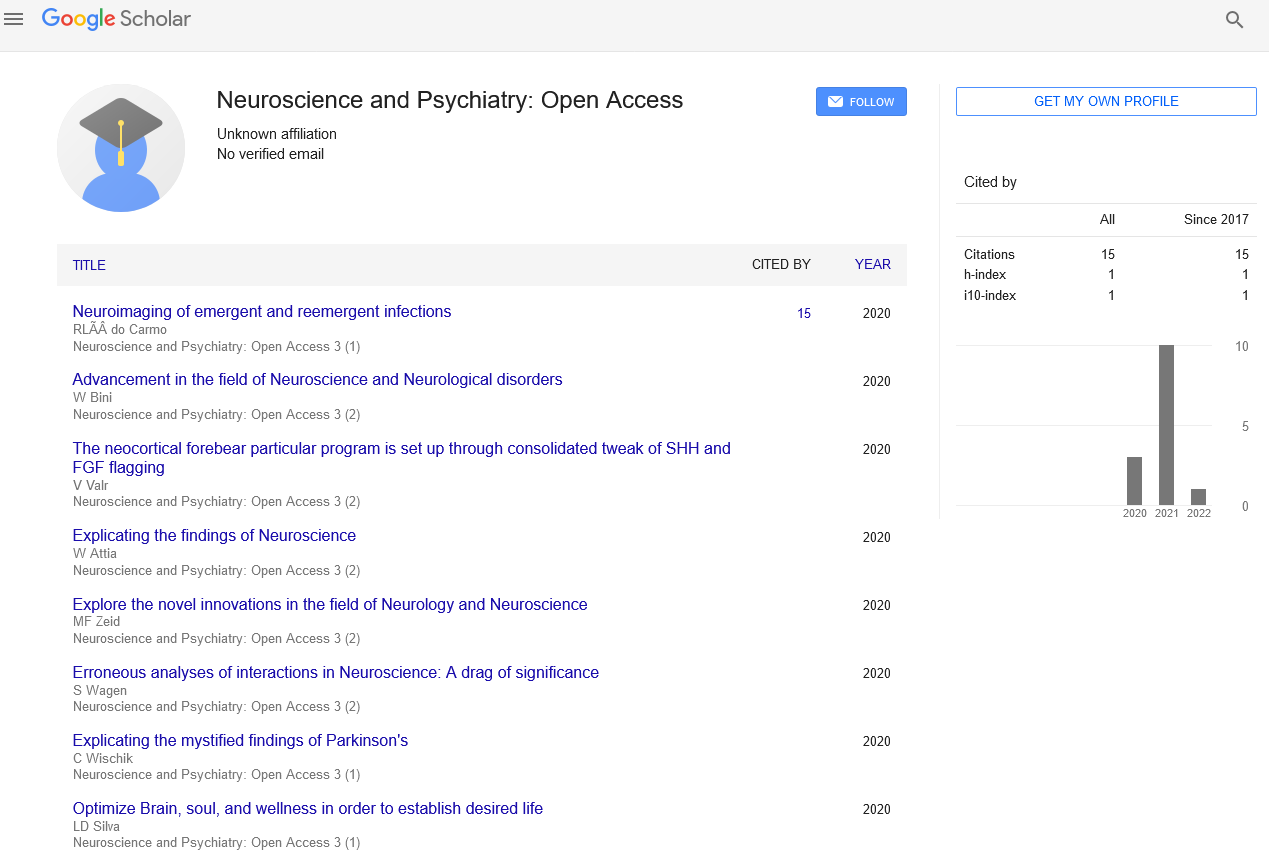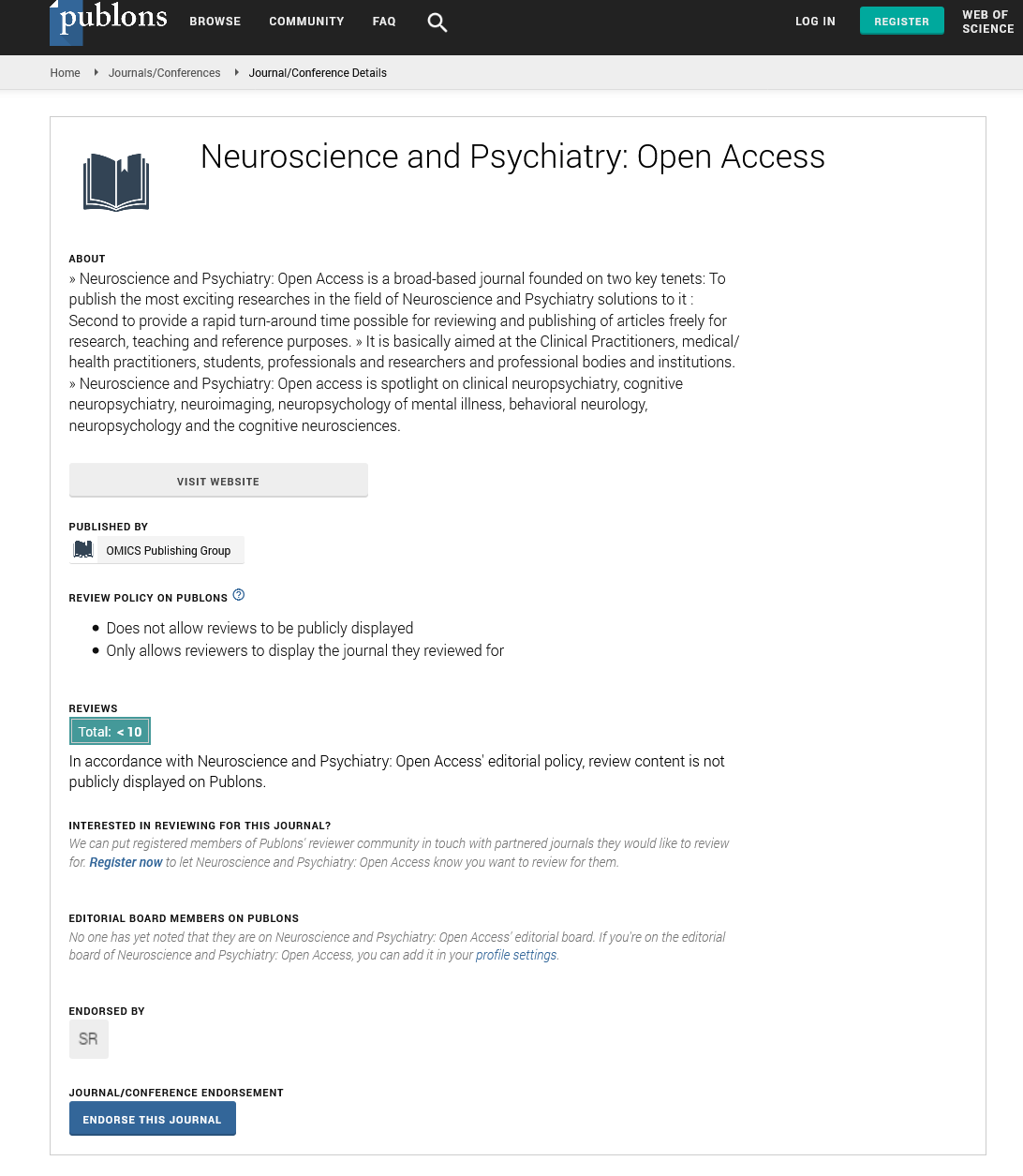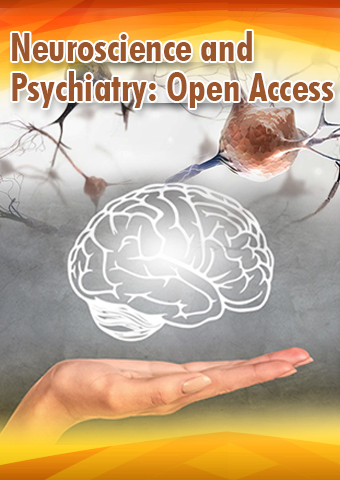Editorial - Neuroscience and Psychiatry: Open Access (2023) Volume 6, Issue 3
Shaping Neurodevelopmental Challenges in Childhood and Beyond: A Comprehensive Exploration of the Causes, Symptoms, and Treatments of Neurodevelopmental Disorders
Genshan Singh*
Department of Pharmacology, Psychology Research Laboratory
Department of Pharmacology, Psychology Research Laboratory
E-mail: genshans@gmail.com
Received: 02-06-2023, Manuscript No. npoa-23-102406; Editor assigned: 05-06-2023, Pre QC No. npoa-23- 102406; Reviewed: 19-06-2023, QC No. npoa-23-102406; Revised: 23-06-2023, Manuscript No. npoa-23- 102406 (R); Published: 30-06-2023; DOI: 10.37532/npoa.2023.6(3).71-73
Abstract
Neurodevelopmental disorders are a complex group of conditions that significantly impact individuals from childhood and continue to shape their lives into adulthood. This comprehensive article aims to explore the intricate web of causes, symptoms, and available treatments associated with neurodevelopmental disorders. By delving into the depths of these disorders, we uncover the multifaceted nature of their causes, including genetic, environmental, and neurological factors. Examining the diverse array of symptoms exhibited by individuals with neurodevelopmental disorders, such as autism spectrum disorder (ASD), attention-deficit/hyperactivity disorder (ADHD), intellectual disability, and specific learning disorders, we gain a deeper understanding of the challenges they face in social interaction, communication, cognition, and behavior. Furthermore, this article highlights the importance of early diagnosis and evaluation conducted by healthcare professionals, who employ standardized assessment tools and collaborate with parents, caregivers, and educators to gain a comprehensive picture of the individual's condition. In terms of treatments, various approaches are explored, including behavioral interventions like Applied Behavior Analysis (ABA), speech and language therapy, occupational therapy, educational interventions, and medication options to manage specific symptoms. Additionally, the significance of holistic management and support is emphasized, with a focus on the vital roles of family involvement, community support, advocacy, and promoting inclusion. Lastly, this article sheds light on current research efforts, promising therapeutic approaches, and future directions in the field of neurodevelopmental disorders. By providing a comprehensive overview, this article strives to contribute to the understanding and improvement of the lives of individuals affected by neurodevelopmental disorders, both in childhood and throughout their ongoing developmental journeys.
Keywords
Neurodevelopmental disorders• Causes• Symptoms • Treatments • Childhood • Adulthood • Genetic factors • Environmental factors • Neurological factors • Autism spectrum disorder • Attention-deficit/hyperactivity disorder • Intellectual disability • Specific learning disorders
Introduction
Neurodevelopmental disorders present significant challenges that extend beyond childhood, shaping the lives of individuals well into adulthood [1]. These complex conditions affect the development and functioning of the brain, resulting in various cognitive, social, and behavioral difficulties. Understanding the intricate web of causes, symptoms, and available treatments associated with neurodevelopmental disorders is crucial for providing appropriate support and interventions to affected individuals [2]. This comprehensive article aims to provide an in-depth exploration of neurodevelopmental disorders, focusing on their causes, symptoms, and available treatments. By gaining a deeper understanding of these disorders, we can enhance our knowledge of the challenges faced by individuals and work towards improving their quality of life [3]. Neurodevelopmental disorders encompass a wide range of conditions, including autism spectrum disorder (ASD), attention-deficit/hyperactivity disorder (ADHD), intellectual disability, and specific learning disorders [4]. These disorders typically manifest in early childhood and persist into adulthood, influencing various aspects of an individual's life, such as social interaction, communication, cognition, and behavior [5]. The causes of neurodevelopmental disorders are multifaceted and involve a combination of genetic, environmental, and neurological factors [6]. Genetic factors play a significant role in many cases, as certain gene mutations or chromosomal abnormalities can disrupt normal brain development. Additionally, environmental factors, such as prenatal exposure to toxins, infections, maternal stress, or complications during pregnancy or childbirth, may contribute to the development of these disorders [7]. Furthermore, neurological factors, including abnormalities in brain structure or function, neurotransmitter imbalances, or disrupted neural connections, can contribute to the manifestation of neurodevelopmental disorders [8]. Identifying and diagnosing neurodevelopmental disorders is a complex process that requires a comprehensive evaluation conducted by healthcare professionals. This evaluation involves a detailed examination of the individual's developmental history, observation of behavior, and the use of standardized assessment tools. Collaborative input from parents, caregivers, and teachers is essential in gaining a comprehensive understanding of the individual's symptoms and challenges. Treatment approaches for neurodevelopmental disorders are diverse and tailored to the specific needs of each individual [9]. Behavioral interventions, such as Applied Behavior Analysis (ABA), aim to teach functional skills, reduce problematic behaviors, and improve communication and social interaction. Speech and language therapy can address language impairments, while occupational therapy focuses on fine motor skills, sensory integration, and daily living activities. Educational interventions provide tailored support and accommodations within the school setting to optimize academic progress. In some cases, medication may be prescribed to manage specific symptoms associated with neurodevelopmental disorders. For example, stimulant medications like methylphenidate may be used to alleviate the symptoms of ADHD, while antipsychotic medications may be prescribed to manage severe behavioral issues in individuals with ASD [10]. Support from family, friends, and the community plays a vital role in the overall well-being of individuals with neurodevelopmental disorders. Support groups, counseling services, and specialized schools or programs can provide a supportive network and additional resources for both individuals and their families.
Causes of neurodevelopmental disorders: The causes of neurodevelopmental disorders are multifactorial, involving a combination of genetic, environmental, and neurological factors. Genetic factors play a significant role in many cases, as certain gene mutations or chromosomal abnormalities can disrupt normal brain development. Environmental factors, such as prenatal exposure to toxins, infections, maternal stress, or complications during pregnancy or childbirth, may also contribute to the development of these disorders. Additionally, neurological factors, including abnormalities in brain structure or function, neurotransmitter imbalances, or disrupted neural connections, can contribute to the manifestation of neurodevelopmental disorders.
Symptoms and diagnosis: Neurodevelopmental disorders exhibit a wide range of symptoms that vary depending on the specific condition. However, some common symptoms include difficulties in social interaction and communication, repetitive behaviors or restricted interests, learning challenges, impulsivity, hyperactivity, and delayed language development. These symptoms can significantly impact a person's academic performance, social relationships, and daily functioning.
Conclusion
Neurodevelopmental disorders present significant challenges that impact individuals throughout childhood and into adulthood. This comprehensive exploration of the causes, symptoms, and treatments of neurodevelopmental disorders has shed light on the intricate nature of these conditions and their lasting effects on individuals' lives. Through the examination of causes, it has become evident that neurodevelopmental disorders result from a combination of genetic, environmental, and neurological factors. Genetic mutations, prenatal exposure to toxins, maternal stress, and disruptions in brain structure and function all contribute to the development of these disorders. Understanding these factors can help guide future research and interventions aimed at prevention and early intervention. The wide range of symptoms associated with neurodevelopmental disorders, such as autism spectrum disorder (ASD), attention-deficit/hyperactivity disorder (ADHD), intellectual disability, and specific learning disorders, underscores the diverse challenges faced by individuals. Difficulties in social interaction, communication, cognition, and behavior can significantly impact daily life and necessitate tailored support and interventions. Diagnosis and early identification play a crucial role in providing appropriate interventions and support. Through comprehensive evaluations conducted by healthcare professionals, including developmental history assessments and standardized tools, accurate diagnoses can be made. Collaboration with parents, caregivers, and educators is essential in gaining a comprehensive understanding of the individual's condition and developing personalized treatment plans. Treatment approaches for neurodevelopmental disorders encompass a range of therapies and interventions. Behavioral interventions, such as Applied Behavior Analysis (ABA), have shown promising results in teaching functional skills, reducing problem behaviors, and improving communication and social interaction. Speech and language therapy, occupational therapy, and educational interventions provide targeted support in specific areas of difficulty. Medication options may be prescribed to manage specific symptoms, although they are typically used as adjuncts to behavioral interventions and therapy.
References
- Lyubomirsky, Sonja. Why are some people happier than others? The role of cognitive and motivational processes in well-being. Am Psychol. 56,239-324 (2001).
- Coomans, Janna. The king of dirt: public health and sanitation in late medieval Ghent. Urban History. 46, 82-105 (2019).
- Gasper Des. Is Sen's capability approach an adequate basis for considering human development?. Rev Int Polit Econ. 14, 435-461 (2002).
- Butler, C. Neurological syndromes which can be mistaken for psychiatric conditions. J Neurol Neurosurg Psychiatry. 76, 31-38 (2005).
- Levy JM, Towers CG, Thorburn A. Targeting autophagy in cancer. Nat Rev Cancer. 17,528-542 (2017).
- Mashour GA, Walker EE, Martuza RL. Psychosurgery: past, present, and future. Brain Res.48,409-19 (2005).
- Heim, Nicola, Griesbeck. Genetically Encoded Indicators of Cellular Calcium Dynamics Based on Troponin C and Green Fluorescent Protein. J Biol Chem. 279,14280-14286 (2004).
- Hribernik, Mussap, AJ. Research note: Leisure satisfaction and subjective well-being. Ann Leis Res. 13, 701-708 (2010).
- Geltner, G. In the Camp and on the March: Military Manuals as Sources for Studying Premodern Public Health. Medical History. 63, 44-60 (2019).
- Jablonka, Szathmáry. The evolution of information storage and heredity. Trends Ecol Evol. 10, 206-211 (1995).
Indexed at, Google Scholar, Crossref
Indexed at, Google Scholar, Crossref
Indexed at, Google Scholar, Crossref
Indexed at, Google Scholar, Crossref
Indexed at, Google Scholar, Crossref
Indexed at, Google Scholar, Crossref
Indexed at, Google Scholar, Crossref


